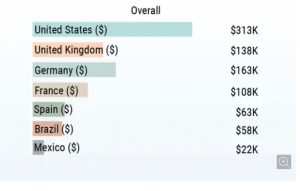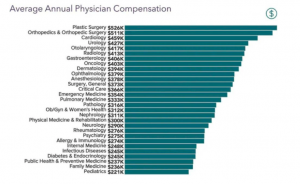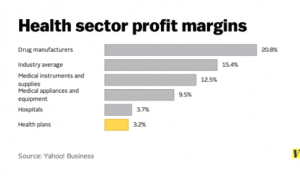A physician posting on MedPage blamed many of the problems in healthcare on private equity…and for-profit insurers.
That takes some…[insert anatomical reference here]. While his assault on Private Equity does have some merit, I can’t let his assertion that the profiteers are insurance companies stand. What makes me nuts is Liu’s mindless and demonstrably false assertion, coupled with his complete inability to see that he is part of US healthcare’s cost problem.
Dr Mitchel Liu stated “For-profit insurance companies have long been regarded as the ultimate offenders in medical profiteering.”
Wow. Coming from a physician, who make more than docs in any other country, that is ballsy indeed.
Liu also says:
“It’s time for medicine, including individuals and professional societies, to restore the integrity of the physician-patient relationship by taking a strong stand against all forms of corporate greed.”
Well, docs are often partners in Ambulatory Surgical Centers and hospital outpatient surgery centers. Many docs belong to big multi-specialty groups that are quite profitable. And, docs make a lot of money.
What does this mean for you, Dr Liu?
How about taking a stand against physician greed, Dr Liu?






Joe: I know you have as much respect for healthcare professionals as I do, so I’m thinking this piece is at least in part a provocation to get a conversation started, but I’ll bite. As you know, the preparation and selection process for American medical schools is insanely rigorous. Moreover, American medical training, both in school and in residency, is also demanding and consuming. You not only have to be the best of the best to complete that process, you need to be driven by an inner desire. No one – at least no one I know – did it just for the money. And the reward for all that sacrifice is a job with long hours and the responsibility for holding (sometimes literally) someone’s life in your hands. As a lawyer, I can promise you that the training, professional standards, demands and responsibility for my profession are nowhere near what physicians go through – and plenty of lawyers make the kind of money (and more) that physicians earn. Accordingly, I don’t begrudge any Doc being paid what the market will bear for their services. Whatever the problems are with the American medical system, somehow reducing physician compensation is not the cure!
Mike – thanks for your note.
I do respect most healthcare professionals.
I’d also say that doctors in most other countries – all of whom get paid a whole lot less than American MDs do – go through these same processes and challenges, yet they don’t moan about the inequity of it all as Dr Liu did.
The problem is – as you state – “what the market will bear.” Family premiums are north of $25k, with deductibles averaging over $3000. at some point, the market will not bear physicians’ desire for higher income.
More to the point, docs accept Medicare, which is about 40% of commercial rates in many jurisdictions.
I have to disagree – docs are going to have to be part of the cure – as they are part of the disease.
be well – Joe
4 years of college averages 100 to 160 for tuition, expenses more The median cost of four years of medical school attendance in 2019-2020 was $250,222 at public institutions and $330,180 at private colleges, according to a fall 2020 report issued by the Association of American Medical Colleges. Then need a year of internship at about $20 an hour and then many years of residency at about 20 to 25 an hour. Try living on $20 an hour in Boston, New York or Palo Alto. Most physicians in USA graduate with crushing debt. Other countries cost less and pay less……
Hello Doug – and thanks for your comment and observations.
You bring up a good point- the medical training process is long and expensive. Couple observations.
1. Many of us also went to college and incurred the expenses you note – and many of us also went to grad school as well. that’s another 2 years and $50k+; a few went onto to doctoral programs which take another 3-5 years and $75 – $150k, and perhaps post-doc fellowships. Post-secondary education is expensive indeed – for all of us. PhDs don’t get paid near what MDs do – they need health care.
2. Many folks live on $20-25 an hour in Boston, NYC, or Palo Alto. They also need health care.
3. Teaching hospitals are heavily subsidized by all of us via taxes, so we all are paying for that education.
4. Healthcare is rapidly becoming unaffordable for many, and is an increasing burden on all taxpayers. The biggest difference between healthcare costs here and elsewhere is price – and a significant portion of that is what private insurers pay physicians.
We are in this together; what angered me – and still does – is Dr Liu’s demonstrably false statement that health insurers are the ultimate “profiteering” offenders. That arrogant ignorance is exactly what we DON’T need if we are to ever solve the health care mess that we are in.
be well – Joe